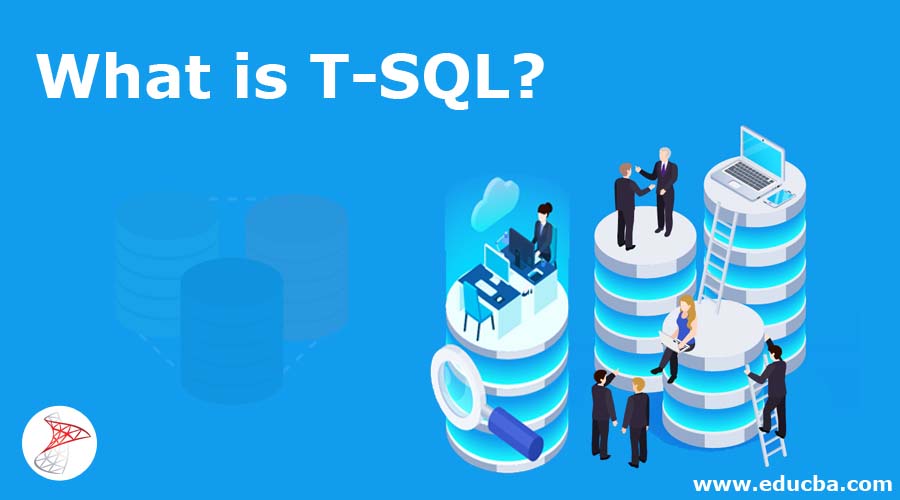Introduction to T-SQL
T-SQL or Transact-SQL is an extension of the Structured Query Language (SQL) from Microsoft that has additional transactional structures or aspects from SQL and is used to operate any of the SQL server-based relational databases. This extension includes multiple new characteristics such as handling exceptions, errors, operation regulations, procedures based, string & date functions, and minor upgrades in a few existing functions like Delete and update, in addition to the existing SQL functions.
It comprises of few add-on features over SQL, like transaction control, declared variables, exception handling functions for mathematical operations, string operations, date and time processing. These additional features significantly represent the generality of the language.
SQL vs T-SQL
Below is the difference between SQL and T-SQL.
Although it provides dominant features, choosing between SQL and T-SQL is up to individual needs. Developers prefer installing Microsoft SQL servers for an application, while they favor SQL for implementing reporting techniques.
SQL is a data-oriented language that processes basic queries like insert, update, and delete. Whereas TSQL is a transactional language used to create the applications, adding core service into the application. SQL uses DDL and DML statements to manipulate objects; it uses step-by-step procedures, views, functions, and triggers on objects in a database.
You can embed the SQL statement into it, but you cannot embed it into the SQL statement. SQL can execute a single statement at a time, but TSQL manages a load of statements simultaneously using different control and iteration structures.
Other languages do not offer the same level of manipulative control that it gives programmers, making integration with Business tools like Dynamics and PowerBI difficult.
Advantages of Using T-SQL
With the obvious difference between SQL and T-SQL, let’s dive deeper to picture the benefits of implementing T-SQL over plain SQL:



In the Finance paradigm, where security is a significant concern, plain SQL can directly expose DB servers as potential threats. It eliminates such threats and enables better handling of sensitive data. It is also often referred to as ‘SQL for Bankers’
User-defined functions in T-SQL facilitate better structuring of transactions in e-commerce websites with optimized, efficient stored procedures. SAP adaptive server considers and opts that it provides efficient data processing functionality.
Working with T-SQL
It is now clearly more than just proprietary plain SQL implementation. It is becoming an essential skill for developers and data professionals. The transition towards T-SQL will seem easy for people working with traditional SQL.
One in-house feature is custom functions, where users can define their functions. Besides, it has inbuilt functionalities, including aggregate, analytical, and major scalar functions. It can configure mathematical notations inside queries from basic to advanced trigonometric functions.
An elegant way of writing procedural programs, subroutines, and functions makes the code compact, readable, and less vulnerable. This has made T-SQL more powerful for analyzing and business operations on data.
As a Microsoft product, T-SQL as an enterprise edition can serve the project best, with supreme business integration viability.
Required Skills
The skills required for a T-SQL developer are merely the same as an SQL developer. Precisely T-SQL developers possess the following core skills:
- Reviewing and Optimizing the Performance of a Query.
- Designing and developing tables aiding the principles and architecture required.
- Articulate experience in designing programming views and procedural and transactional programming.
- Understanding the implementation of a cloud with a database can be an added advantage.
Major Features of SQL
Below are some major features.
- Procedural programming
- Various computational, scalar, and mathematical support functions.
- Data manipulation commands with FROM clause that can be used along with Join operations.
- BULK INSERT functionality to import large data files.
Scope
Clients worldwide continue to create and update their systems along with the technological paradigm shift. A Strong base of T-SQL knowledge will be essential on the road toward the data science world.
However, just the foundation of T-SQL will not be sufficient; building a complementary experience on skillset including R/Python will drive T-SQL developers into data science. It has a broad space in big data. It entirely depends on the individual’s objective, and the factors influencing the future of T-SQL are subjective. With a frequency shift in the industrial landscape, it seems to be a fit dimension towards where the industry is shaping.
Data vaults are evolving, and CRM and ERP also need a developed computational solution to look at data as more descriptive, prescriptive, and cognitive. Massively Parallel processing platforms have been emerging quickly, which fits rightly better than traditional SQL.
Conclusion
Precisely it is more robust and reliable. The additional features have made it a Turing complete language representing universal acclaim. SQL is not Turing complete. Thus, we can precisely refer to it as a powerful computational language that continues to advance regardless of the progress in the industry.
Recommended Articles
This has been a guide to What is T-SQL? Here we have discussed T-SQL’s features, scope, skills, working, and advantages. You can also go through our other suggested articles to learn more –



